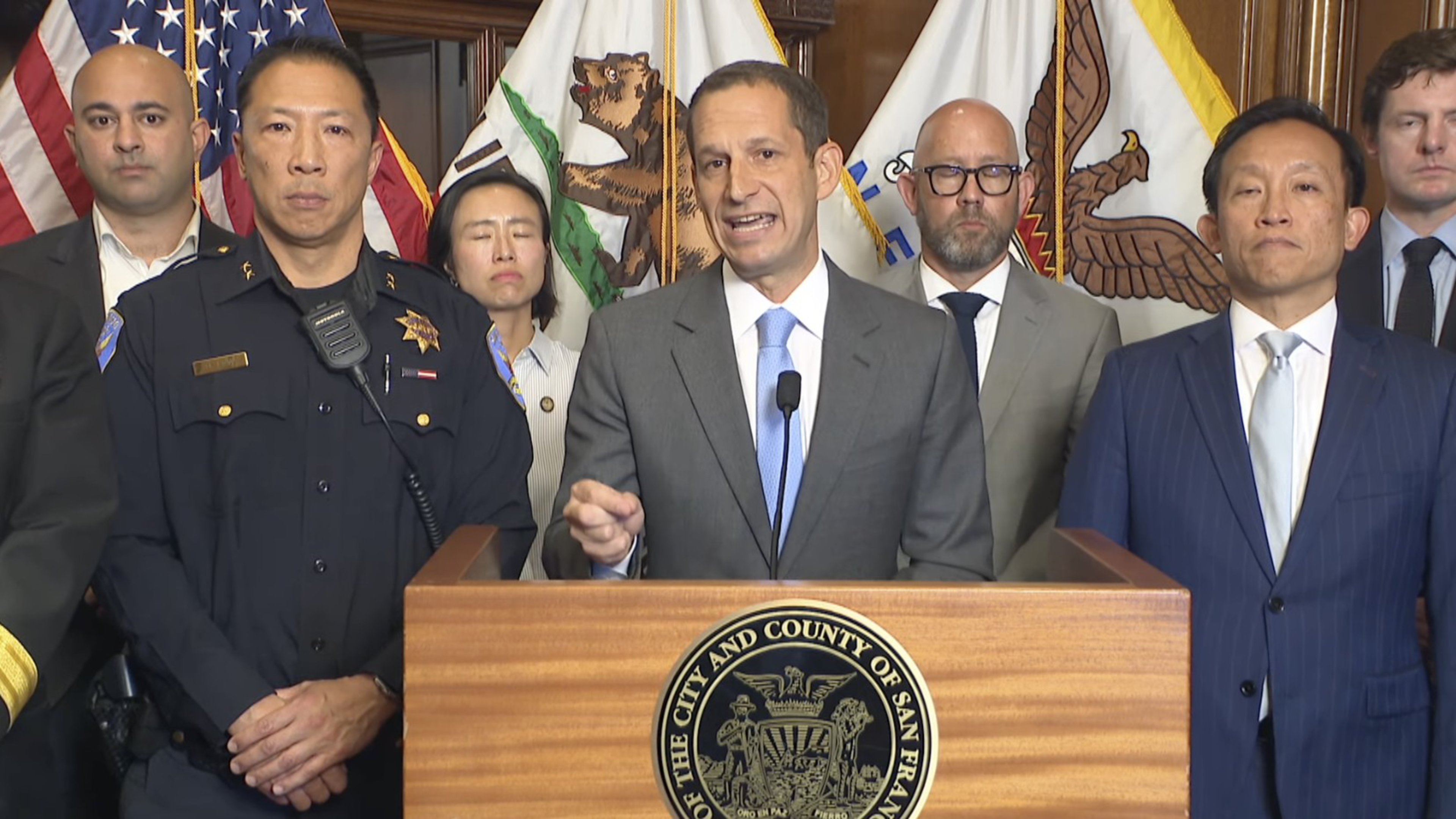When Mayor Daniel Lurie addressed the press on Wednesday, he projected confidence: San Francisco is ready for mass immigration enforcement action. But at a closed-door meeting later that day, he failed to inspire the same confidence in activists and immigration rights leaders.
Nonprofit leaders asked if Lurie would enact a state of emergency, like Los Angeles County did recently, which would allow local government to provide resources to those affected by immigration raids. Others asked about suspending the towing of RVs, which provide housing for many immigrants in San Francisco; an eviction moratorium; and establishing safe zones that federal agents cannot enter.
The mayor, according to activists and legal aid workers present, was noncommittal.
“His main motif is that SF police are gonna be there to protect local residents, and they’re not gonna cooperate [with federal agents],” said Gabriel Medina, executive director of La Raza Community Resource Center.
Lurie ripped the likely deployment of federal agencies at a news conference on Wednesday, where he announced an executive directive (opens in new tab) to support immigrant communities and reaffirmed that local government will not support federal immigration operations. The mayor said militarized immigration raids across the country are designed to incite fear, violence, and chaos, which the federal government can then use to justify deploying troops on the streets of Democrat-run cities.

Medina said he agreed — but that the way to combat fear was to better inform residents.
“That means the mayor has to be that much more communicative,” he said. “This is a state of emergency for us.”
Even before news broke that more than 100 agents, including some from U.S. Customs and Border Protection, would begin to arrive on Thursday as part of a federal law enforcement surge, community organizations were bracing for a crackdown.
Some that serve undocumented populations began ramping up outreach efforts, distributing know-your-rights leaflets and telling people what to do if federal agents show up at their door:
“Stay silent, don’t open the door, don’t sign, don’t lie,” Medina said.
Others devised a protest schedule meant to snap into action when federal officers arrive. So far, the plan (shared on the websites of Bay Resistance (opens in new tab) and Indivisible SF (opens in new tab), which helped organize the recent 50,000-strong “No Kings” protest) is to rally at the Embarcadero at 5 p.m. on the day federal agents arrive, and then to rally at local libraries at 5 p.m. the following day.
More grassroots protests will undoubtedly arise. But the response to this federal “invasion,” as activist groups are describing it, goes beyond marches, chants, and Instagram fliers.
Some groups are focused on mobilizing volunteers to occupy likely sites of immigration raids. It’s a strategy based on the “Adopt a Day Labor Street Corner” program developed by the L.A.-based National Day Laborer Organizing Network.
The idea is to post observers at hardware stores, truck rental parking lots, and other locations where day laborers gather to find work. If observers see immigration agents, they can report it to the Rapid Response Network, effectively giving the community defense organization eyes across the region. After verifying the sighting, the RRN can then publicize it, helping people avoid the area.
Local affiliates of NDLON plan to expand the program beyond jornalero (day laborer) hot spots and deputize volunteers to patrol streets in heavily Latino neighborhoods, like the Mission and Excelsior.
“A lot of people want to take action and protect their neighbors,” said Sasha Wright, an organizer running communications for Bay Resistance and affiliated organizations. “We have thousands of people signing up on our website (opens in new tab) to join pods.”
These pods, which are often organized by ZIP Code, are able to quickly mobilize for protests and rush to street corners as legal observers.
Day laborers aren’t the only San Franciscans at risk. Jennifer Alejo, executive director of Trabajadores Unidos, said workers at car washes and warehouses are also particularly vulnerable, based on past raids.
Her organization is focusing on outreach to these sites in an attempt to ensure that workers know about their right to remain silent or see a warrant, as well as the state’s Immigrant Worker Protection Act, which prevents employers from allowing immigration agents into nonpublic areas of a workplace.
Alejo is also preparing to reach out to people detained by immigration agents during raids. Her advice overlaps with Medina’s: Don’t say or sign anything, because you might be signing a voluntary removal document.
In L.A., Alejo said, Trabajadores Unidos helped 11 workers arrested by ICE pay bonds to get out of detention. (Only people without active immigration proceedings have this option.) She hopes to free more people detained in the days and weeks to come.
“We just want families to know that it’s possible,” she said. “Folks don’t know that they have rights inside.”
She added that lawyers have successfully argued against the deportation of immigrants detained in raids that were judged to be illegal.
Wright said local groups have been preparing for a mass federal presence in the Bay Area since President Donald Trump sent troops to L.A. in June. Lara Kiswani, executive director of the Arab Resource Organizing Center, said that the surge in activism around Israel’s war on Hamas in Gaza since 2023 has created a strong protest infrastructure.
“For the last two years, we have organized in unprecedented numbers,” Kiswani said. Now, many of the people AROC organized are eager to rally against federal troops.
It’s unclear whether protesters will be in the streets Thursday, when federal agents will reportedly arrive on Coast Guard Island in Alameda. The next confirmed steps are a Bay Resistance planning call at 6 p.m. Wednesday and a forum on immigrant defense (opens in new tab) Sunday at the Islamic Cultural Center of Northern California in Oakland.
The San Francisco Rapid Response Network verifies reported ICE sightings in the city. Its phone number is (415) 200-1548.
